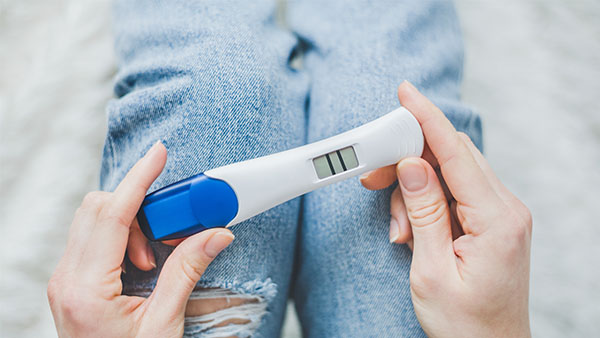Early signs of pregnancy
All pregnancies are different. Most women don't notice any signs of pregnancy before the fertilised egg has attached to the lining of the womb. You'll begin to wonder if you're pregnant when you miss your period. Early signs of pregnancy aren't easy to recognise, but some symptoms are definitely a sign that you could be pregnant. Read about the early signs of pregnancy here.
Read time: 4 m
Verified by Jenny Jansson
Certified midwife
If you're actively trying to have a baby there are early telltale signs of pregnancy to look out for. The brain is good at focusing on our desires. You might also be pregnant without noticing anything is different.
The first sign that you could be pregnant is missing your period if you have a regular menstrual cycle. You can experience a small bleed before your usual period called an implantation bleed which happens when the egg attaches to the lining of the womb. Implantation bleeding is an early pregnancy sign.
Feeling sick is a classic sign, but this varies from pregnancy to pregnancy. An early sign of pregnancy is feeling sick around week six, due to the increased levels of pregnancy hormones. Some women do not experience sickness, whilst others are sick throughout their pregnancy.
Pain that feels like period pain and stomach pain could be a sign of pregnancy. This is usually experienced as a dull ache in your lower abdomen or back. This ache can be an early sign of pregnancy and is caused by the quick growth of the womb.
Another early sign of pregnancy is a headache. Increased levels of progesterone can cause headaches. Avoid aspirin and take paracetamol if you are experiencing a bad headache.
You might notice changes in your breasts during the first weeks of pregnancy. This is caused by increased levels of the hormones progesterone, oestrogen and prolactin, as the body prepares for milk production. Your breasts might feel larger and lumpier and are often tender and sensitive. Your nipples can grow and become darker and you might feel nipple irritation.
If you're pregnant your body temperature can increase. Ovulation can cause a rise in body temperature. This increase of about half a degree remains if you're pregnant. If you notice that your temperature doesn't return to normal after ovulation you might be pregnant.
You might feel like you need to urinate more frequently and get up in the middle of the night to urinate - this can be an early sign of pregnancy. This usually occurs when you are six to eight weeks pregnant and is caused by the womb pressing on the bladder and more pressure on the kidneys. This increases the amount of blood in your body.
Hormonal changes in your body start immediately when you're pregnant. It can cause sudden mood swings that can be hard for you and the people around you to understand. You might be close to tears more often and cry for no reason.
Extreme tiredness is also a common early sign of pregnancy. For the first eight to ten weeks, you'll feel exhausted. This is probably caused by an increase in the hormone progesterone at the start of pregnancy. Your body is also working flat out so it's not surprising you feel so tired.
Lots of women notice that their sense of smell changes and suddenly they can't stand certain smells. The same thing can happen with taste. Your sense of taste can change and you might suddenly get cravings for strange things. You might also suddenly be disgusted by things you usually like.
A strange early sign of pregnancy is a metallic taste in your mouth. It's not clear why this is, but it might be because your gums are more sensitive and bleed more easily.
The body's intensive production of female sex hormones early in your pregnancy often affects your digestive system. This is caused by the hormone progesterone that is produced during pregnancy. Your stomach can feel bloated early in pregnancy, not because of the baby, but because your digestive system isn't working properly which makes your abdomen feel bloated and gassy.
Another early sign of pregnancy is vaginal discharge. Hormonal changes in pregnancy can cause increased discharge which is often white and odourless.
If you suddenly feel unusually dizzy or faint when you've been on your feet for a long time or stand up quickly, it could be a sign of pregnancy. This is caused by a decrease in your blood pressure in early pregnancy. You'll be most affected if your blood pressure was already low. Blood pressure usually stabilises after a while and is regularly checked throughout pregnancy.
Verified by Jenny Jansson
Certified midwife
More from Preggers
Hundreds of related articles, podcasts & more waiting for you in the Preggers app.
Download Preggers today.

